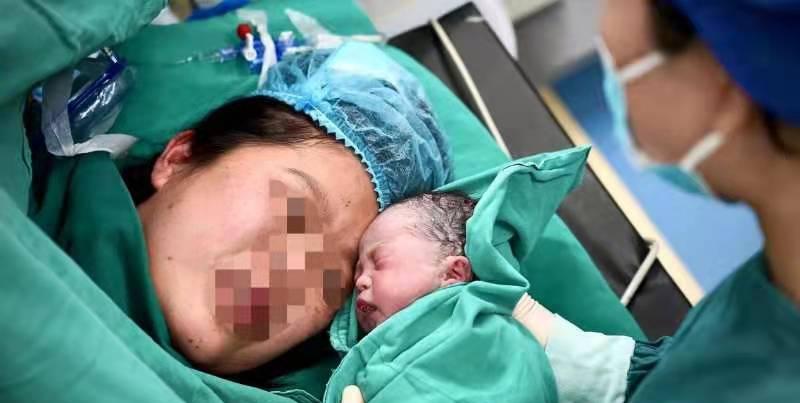
Beijing Youth Daily reporter learned from the staff of the Union Hospital Affiliated to Wuhan Huazhong University of Science and Technology on the 28th that on the 26th, a 37-year-old woman who had undergone heart transplant surgery 10 years ago successfully gave birth to a baby girl in the hospital.
According to reports, when the woman was 27 years old, she went to the Department of Cardiac And Macrovascular Surgery of Union Hospital Affiliated to Huazhong University of Science and Technology for treatment due to heart disease, and due to severe heart failure, Dr. Dong Nianguo of the hospital performed heart transplant surgery for her in 2012.
After the change of heart, the woman's recovery is in good condition, not only smoothly returned to society, but also formed her own family. In early 2018, the woman contacted Zhang Jing, the attending physician of the department of cardiac and macrovascular surgery at the hospital, again, and expressed her desire for a child.
Dong Nianguo said frankly that the literature shows that there were indeed cases of patients with stable condition after heart transplantation, but because of the need to take anti-rejection drugs after heart transplantation, even pregnancy cannot be interrupted, and most anti-rejection drugs have certain teratogenic and miscarriage risks. In addition, the drug can exacerbate the prevalence of gestational diabetes, gestational hypertension, and increased cardiac load.
After learning about the woman's ideas, Dong Nianguo and Zhang Jing's team formulated a 2-year "pregnancy preparation plan" for the woman, and adjusted the medication according to her situation and followed up regularly. But the woman was not pregnant for a long time, Zhang Jing recalled, the doctor once proposed to the woman to focus on the body, first adjust the dose of the drug to the state before the pregnancy.
Fortunately, at this time, the news of the woman's pregnancy came, and Zhao Yin, deputy director of the Obstetrics Department of the Union Hospital Affiliated to Huazhong University of Science and Technology, recalled that after the woman became pregnant, she encountered many challenges: "Congenital thalassemia, gestational hypertension, gestational diabetes, pregnancy complicated by cholestasis syndrome and other problems followed, but after careful treatment and care, pregnant women and fetuses are in good condition." ”
Zhao Yin introduced that during pregnancy, obstetrics strengthened obstetric examination and ultrasound monitoring of the fetus, in order to ensure that the impact of anti-rejection drugs on the fetus was minimized, the Department of Cardiac Surgery changed the types of anti-rejection drugs for patients and adjusted the safe dose.
On December 29 last year, the pregnant woman was 31 weeks pregnant, Zhao Yin organized a general consultation of the whole hospital, jointly multidisciplinary to conduct a detailed assessment of her condition, and determined the management plan and emergency plan for the late pregnancy: after strict management, close monitoring, comprehensive assessment and many discussions by the team, it was decided to continue the pregnancy under close supervision. In order to ensure the safety of the mother and baby, it was finally decided to perform a caesarean section on the woman at 36 weeks' gestation.
According to the doctor, on January 26, the woman underwent surgery and gave birth to a baby girl weighing 4.3 kilograms, and the child cried loudly. Postoperative mother-daughter vital signs are stable.
Zhao Yin reminded: "The desire to get pregnant is understandable, but women with special diseases need to consider carefully. She said that women with heart disease, hemophilia, hypertension, diabetes, liver and kidney system diseases, systemic lupus erythematosus and other diseases must do a systematic examination before pregnancy, and a detailed risk assessment by the obstetric multidisciplinary team, because the pregnancy process is likely to lead to aggravation of the disease, and serious will also endanger life.
(Beijing Youth Daily reporter Qu Chang correspondent Chen Youwei)
For more information, keep an eye on Qnews
【Copyright Notice】The copyright and other intellectual property rights of this work belong to [Beiqing Qnews], Shenzhen Tencent Computer System Co., Ltd. enjoys the right to disseminate the information network of this article, and any third party shall not reprint it without authorization.